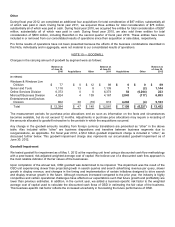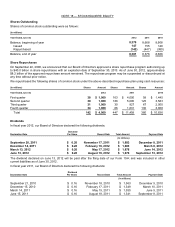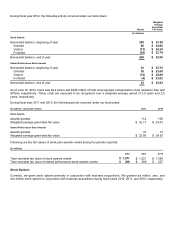Microsoft 2012 Annual Report Download - page 71
Download and view the complete annual report
Please find page 71 of the 2012 Microsoft annual report below. You can navigate through the pages in the report by either clicking on the pages listed below, or by using the keyword search tool below to find specific information within the annual report.
exclusion order against Motorola prohibiting importation of infringing Motorola Android devices. In May 2012, the ITC
issued the limited exclusion order recommended by the ALJ, which became effective on July 18, 2012. Microsoft has
appealed certain aspects of the ITC ruling adverse to Microsoft; Motorola is expected to appeal the ITC exclusion order.
In November 2010, Motorola filed an action against Microsoft in the ITC alleging infringement of five Motorola patents by
Xbox consoles and accessories and seeking an exclusion order to prohibit importation of the allegedly infringing Xbox
products into the U.S. In April 2012, the ALJ found that Xbox products infringe four of the five patents asserted by
Motorola. The ALJ subsequently recommended that the ITC issue a limited exclusion order and a cease and desist order.
Both Microsoft and Motorola sought ITC review of the ALJ’s findings. In June 2012, Microsoft filed a motion to terminate
the investigation as to certain patents based on facts arising as the result of Google’s acquisition of Motorola. The ITC
determined that it would review the ALJ’s initial determination in its entirety and remanded the matter to the ALJ (1) to
apply certain ITC case precedent, (2) to rule on Microsoft’s June 2012 motion to terminate, and (3) set a new target date
for completion of the investigation. If the ITC issues an exclusion order or cease and desist order, it will be subject to
Presidential review for up to 60 days, during which it is expected that Microsoft could import Xbox products subject to
posting a bond. Should any order issue and survive Presidential review, Microsoft may be able to mitigate its impact by
altering Xbox products so they do not infringe the Motorola patents.
U.S. District Court
The Seattle District Court case filed in October 2010 by Microsoft as a companion to Microsoft’s ITC case against
Motorola has been stayed pending the outcome of Microsoft’s ITC case.
In November 2010, Microsoft sued Motorola for breach of contract in U.S. District Court in Seattle, alleging that Motorola
breached its commitments to standards-setting organizations to license to Microsoft certain patents on reasonable and
non-discriminatory (“RAND”) terms and conditions. Motorola has declared these patents essential to the implementation
of the H.264 video standard and the 802.11 Wi-Fi standard. In suits described below, Motorola or a Motorola affiliate
subsequently sued Microsoft on those patents in U.S. District Courts, in the ITC, and in Germany. In February 2012, the
Seattle District Court granted a partial summary judgment in favor of Microsoft ruling that (1) Motorola entered into binding
contractual commitments with standards organizations committing to license its declared-essential patents on RAND
terms and conditions; and (2) Microsoft is a third-party beneficiary of those commitments. Subsequently, the court rejected
Motorola’s argument that Microsoft had repudiated its right to a RAND license, and ruled a trial is needed to determine
whether Motorola is in breach of its obligation to enter into a patent license with Microsoft and, if so, the amount of the
RAND royalty. In April 2012, the court issued a temporary restraining order preventing Motorola from taking steps to
enforce an injunction in Germany relating to the H.264 video patents. In May 2012, the court converted that order into a
preliminary injunction. Motorola has appealed the court’s injunction orders to the Court of Appeals for the Ninth
Circuit. The Seattle court has set a trial to determine the RAND royalty to begin in November 2012.
Cases filed by Motorola in Wisconsin, California, and Florida, with the exception of one currently stayed case in Wisconsin
(a companion case to Motorola’s ITC action), have been transferred at Microsoft’s request to the U.S District Court in
Seattle. Motorola and Microsoft both seek damages as well as injunctive relief. No trial dates have been set in any of the
transferred cases, and the parties have agreed to a stay of these cases.
• In the transferred cases, Motorola asserts 15 patents are infringed by many Microsoft products including
Windows Mobile 6.5 and Windows Phone 7, Windows Marketplace, Silverlight, Windows Vista and 7,
Exchange Server 2003 and later, Exchange ActiveSync, Windows Live Messenger, Lync Server 2010, Outlook
2010, Office 365, SQL Server, Internet Explorer 9, Xbox, and Kinect.
• In the Motorola action originally filed in California, Motorola asserts that Microsoft violated antitrust laws in
connection with Microsoft’s assertion of patents against Motorola that Microsoft has agreed to license to certain
qualifying entities on RAND terms and conditions.
• In counterclaims in the patent actions brought by Motorola, Microsoft asserts 14 patents are infringed by
Motorola Android devices and certain Motorola digital video recorders.
























